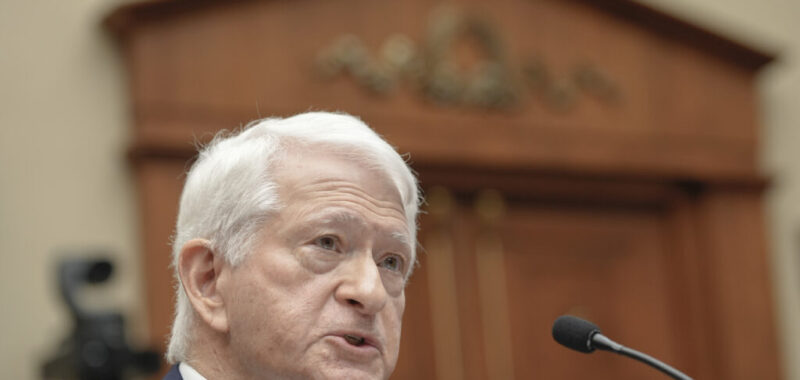UCLA Chancellor Gene Block testifies during a hearing of the House Committee on Education and the Workforce regarding pro-Palestinian protests on college campuses on Capitol Hill on May 23, 2024, in Washington.
Credit: AP Photo / Mariam Zuhaib
This story was updated with additional quotes and information from Thursday’s hearing.
Testifying in front of a congressional committee Thursday, UCLA Chancellor Gene Block said he regrets not acting sooner to remove the pro-Palestinian encampment that was violently attacked last month by counter protesters.
“With the benefit of hindsight, we should have been prepared to immediately remove the encampment if and when the safety of our community was put at risk,” Block said during prepared remarks to the Republican-led House Committee on Education and the Workforce.
Block, who himself is Jewish, testified before the committee in Washington, D.C., as part of a hearing on antisemitism on college campuses. It was the third time the committee had called on university leaders to testify about antisemitism since last fall, and the first time that a chancellor or president from California has testified.
Testifying alongside Block were Michael Schill, the president of Northwestern University, and Jonathan Holloway, the president of Rutgers University.
For the most part, Block avoided harsh questioning during the hearing, with lawmakers spending more time grilling Holloway and especially Schill. Some of his most insightful remarks came during his opening statement, when he addressed the encampment that sprang up on the UCLA campus on April 25.
Block said he initially followed UC system guidance, which is to only use law enforcement to remove protesters “when absolutely necessary” to protect the safety of the campus.
But as the encampment grew to more than 500 protesters, “some of whom were not even affiliated with UCLA,” Block said he decided on April 28 to remove the encampment. He then gave the protesters written notice on April 30, but it was too late. Later that night, a violent mob of counter demonstrators attacked the encampment, resulting in injuries and hospitalizations.
Meanwhile, as Block addressed the lawmakers Thursday, protesters on UCLA’s campus were erecting a new encampment Thursday.
Later during Thursday’s hearing, Rep. Ilhan Omar (D-Minn.) questioned Block about the violent attacks, which she said he could have prevented.
“The recent images from UCLA are appalling. What is more appalling is that it was completely preventable. You could have prevented this by protecting the diverse groups of pro-Palestinian students that were peacefully gathered on campus,” she said.
“Are any of these people in jail?” Omar then asked, referring to the counter protesters who attacked the encampment.
Block said Los Angeles police are still working to identify the assailants from that evening.
“It’s been over a month,” Omar responded.
Block also faced questions over allegations that the UCLA encampment was blocking Jewish and pro-Israel students from parts of campus. Rep. Kevin Kiley (R-Calif.) shared a video that he said showed Jewish students being blocked by encampment protesters from getting to class.
“After we learned about that, I sent a message to all our student affairs people to make sure the pathways were open for everyone. And I sent the message out to our community,” Block said when Kiley asked if the encampment protesters were disciplined, an answer that did not satisfy Kiley.
Rep. Virginia Foxx, the Republican chair of the committee from North Carolina, also criticized Block for that incident. In her closing remarks, Foxx said there was “horrifying footage of encampment members setting up illegal checkpoints, denying Jewish students access to central parts of campus.”
Republicans spent more time questioning Schill, the Northwestern president. They criticized him for coming to an agreement with pro-Palestinian protesters on his campus, but Schill defended himself and said he “rejected the main student demand of divestment.” Northwestern’s agreement did include a promise to disclose more information about its investments.
“We had to get the encampment down,” Schill said Thursday. That answer, however, did not satisfy lawmakers.
Outside the hearing, faculty members from Rutgers, Northwestern and UCLA criticized Republican lawmakers over the hearing and said it was an attack on higher education.
That included Mia McIver, an English professor at UCLA who during a live streamed press conference called the hearing a “shameful farce.”
“Instead of focusing on learning, teaching, inquiry, understanding, analysis, and argumentation, which are the primary functions of higher ed, the committee’s perverse obsession with harsh discipline and bizarre thirst for punishment revealed that the real goal is to shut down repress, suppress and criminalize constitutionally protected speech and action,” McIver said.

